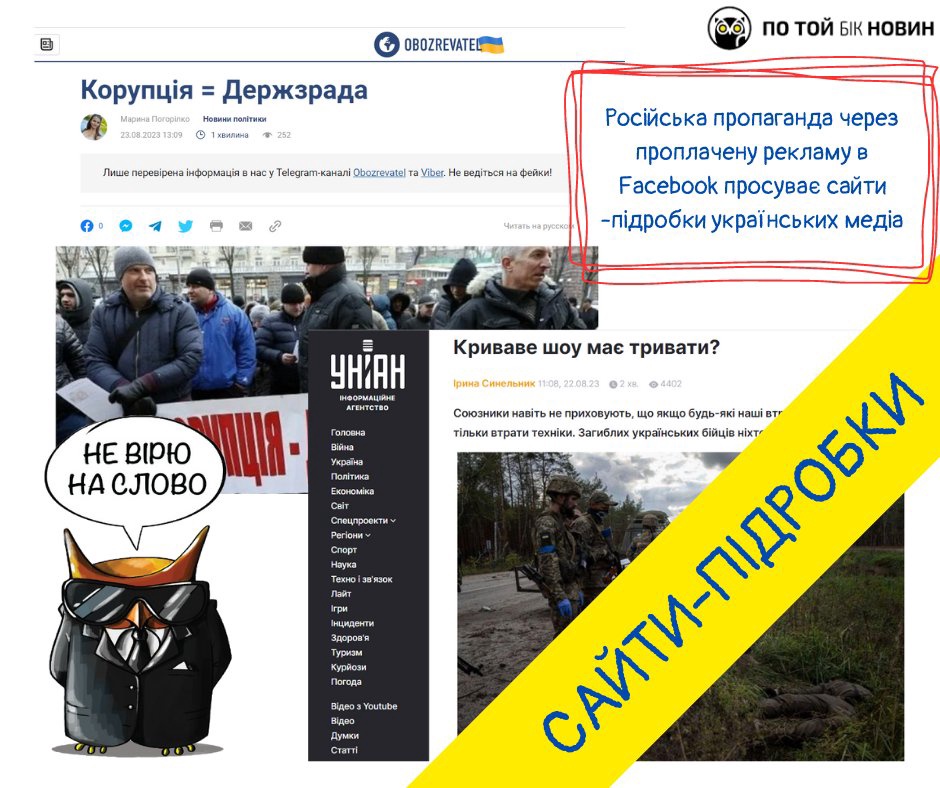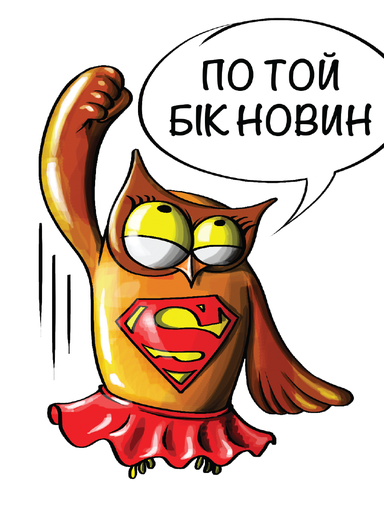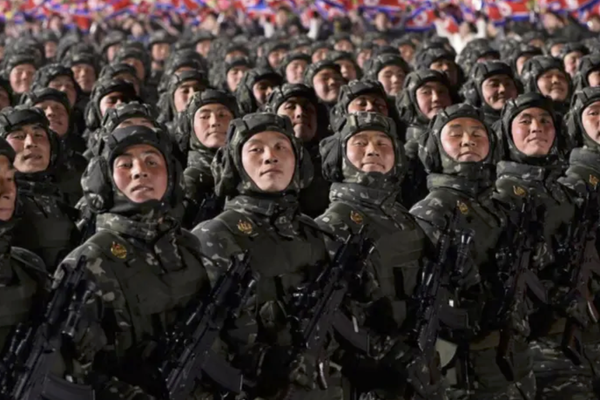Russian propaganda promotes fake Ukrainian media sites through paid Facebook ads

The information war has escalated to a new level. Have your posts or comments been repeatedly removed because they contain evidence of Russian crimes that don’t align with the idealized image of a world seen through rose-tinted glasses? Or perhaps social media algorithms don’t like you referring to Russians by their historical name?
Don’t rush to blame yourself for feeling frustrated; it’s not about you. It’s about double standards. Facebook is willing to let you speak the truth, but at a price. For money, it even permits the dissemination of falsehoods and supports fake websites, a tactic actively employed by Russian propagandists who operate under the guise of automated bots.
The news feed is literally inundated with paid posts labeled as “advertising.” These posts spread notions of “betrayal” and blatant lies. In summary: the Ukrainian government is mired in corruption; Western aid is “going to the dogs”; the military is incapable of withstanding the Russian missile onslaught, and therefore urgent negotiations are needed; and newly mobilized individuals are sent into combat unprepared.
After reading such blatant lies, it can be difficult for those without critical thinking skills to resist venting their frustrations towards the Ukrainian government and military leadership. This reaction plays directly into the hands of propagandists, who aim to divide society and undermine trust in decision-makers.
Let’s examine a few recent examples:
- Corruption:
“Instead of allocating funds to combat corrupt persons, who will disappear into thin air as usual, we need to judge them as traitors; that’s correct as it stands…” This sentiment is substantiated with a cartoon image of a Ukrainian soldier without trousers and a reference to a source with detailed information.
Upon clicking, you are directed to an article titled “Corruption = High Treason” on a website posing as Obozrevatel. The authorship is attributed to journalist Maryna Pohorilko.
However, this is a fake website, masquerading as the genuine Obozrevatel publication. A telltale sign is the domain: the fake version contains some kind of “ltd,” while the legitimate Obozrevatel employs the standard “com” domain.
This is a common trick employed by fraudsters. Just in June, we reported on the fake website imitating the Ukrainian edition of RBC-Ukraine. Russian propagandists disseminated a fabricated article on it, quoting an equally false Facebook post supposedly authored by Commander-in-Chief of the Ukrainian Armed Forces, Valeriy Zaluzhnyi, in the name of news feed editor Dmytro Braslavskyi. Other reputable Ukrainian publications have also been victims of such fakes in the past.
- We must engage in negotiations
Another instance of Russian spoofing:
“While we face a relentless barrage of deadly missiles, foreign actors are profiting from this conflict. We won’t be able to create a mechanism to counter these missiles. We need to initiate negotiations before these Kalibr missiles completely destroy Ukraine,” as indicated in the provided link.
Upon clicking the link, you’re re-directed to what seems to be the UNIAN website. Specifically, it leads to an article by Sinelnyk titled “Should the blood show go on?”
However, similar to the previous example, this is a fake version of the authentic news agency website. A quick visit to the main page and examination of the address bar reveal it to be complete gibberish, and not at all the way it should be.
In both cases, the names of the journalists are authentic, yet they are entirely unrelated to these propaganda publications. We reached out to Iryna Synelnyk, who confirmed her affiliation with UNIAN. However, this was the first time she had heard of this fake article.
“I received threats last week, accusing me of being pro-Russian. But it’s not true, so I blocked the person,” Iryna informed us.
This incident shows that the propaganda scheme is partially successful. The individual in question likely read the fake article. While they were perceptive enough to understand that it was pure propaganda, they didn’t realize that the journalist was obviously being manipulated.
Mobilized individuals are sent to the slaughter without adequate training
“Our leadership conceals the actual figures from us. The genuine death toll may reach one million. Should the situation persist, we may soon find ourselves with no defenders,” reads the text. It’s accompanied by an image saying that untrained mobilized Ukrainians continue to be sent in small groups to be slaughtered.
In this particular case, a link is also provided at the end. However, in contrast to the previous two instances, it directs to a legitimate article on the authentic New York Times website.
However, there is NOT A SINGLE WORD about Ukrainians being sent to the slaughter without adequate training, nor is there any reference to the potential toll of one million Ukrainian soldiers.
The article reports, “US officials indicate that the combined number of casualties in the war in Ukraine, including both Ukrainian and Russian forces, approaches 500,000.”
Instead of a summary
All of these fakes originate from newly created accounts with peculiar, hastily concocted usernames: lustrous kosher, This Free, Profuse Past, and others. When confronted with such false Facebook advertisements, you should submit a complaint. With a sufficient number of complaints, these posts will be removed.
However, this approach merely addresses the symptoms. Tomorrow, Russian propagandists will likely create numerous other fake accounts, from which they will once again purchase advertising space in your news feed. What is truly required are systemic solutions, possibly at the level of institutions such as the Ministry of Digital Transformation of Ukraine and the Ministry of Culture and Information Policy of Ukraine, which should engage in direct communication with the official administration of Facebook ![]()






